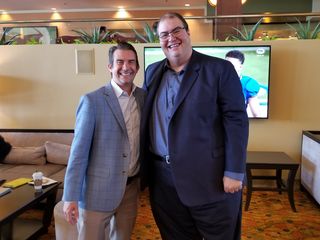
Attention
Why Think Time Is So Important in a Distracted World
An entrepreneur on taking think time to spot opportunity
Posted February 1, 2018

If you want to spot opportunity you have to focus your attention. Focus requires think time and think time isn’t always easy to come by. One thing great entrepreneurs have in common is their ability to find the time to think and refocus their minds on spotting the next great opportunity.
Murad Al-Katib, President and CEO of AGT Food and Ingredients Inc. is no different. While at the recent EY Entrepreneur of the Year Awards and Strategic Growth Forum in Palm Springs, California I sat down with Al-Katib, the 2017 EY World Entrepreneur of the Year award winner, to chat about opportunity, think time and regret.
Make Time for Think Time
Time is incredibly valuable and it is something we can never get back. Determining how to best spend our time can be a struggle. Many successful entrepreneurs have found that striking a balance between spending their time doing vs. spending their time thinking can make a huge difference when it comes to making progress towards the future. A survey of entrepreneurs conducted by EY found that over 41 percent of respondents reported setting aside more than 20 percent of their week to focus on new business ideas and innovation. Al-Katib is no different.
As the leader of a global company Al-Katib travels extensively throughout the year which provides him with a lot of opportunity to think. He feels that flight time is actually a great time to disconnect, reflect and think about the future. “I would estimate 80 percent of my flight time would be think time” claims Al-Katib. “I started that very early on” because think time is hard to come by and flying affords you the opportunity to focus with minimal interruptions.
Focus to Spot Opportunity
“Opportunity to me is identifying somebody else’s challenge, seeing the gap, figuring out how you’re going to fill it and then executing. That’s true opportunity.” That said, Al-Katib points out that it is important to understand the commercial and economic viability of an idea before you can really consider it an opportunity. Because if you can’t deliver on it than it isn’t an actual opportunity it’s just an idea. “There’s a difference between idea and opportunity.” We all have ideas, but rarely do they get converted into opportunities.
Al-Katib also believes it is important to point out that opportunity is less about creating a need than it is about understanding the challenges of others. Al-Katib notes that, “creating need is tough. I think it can be done, but I really like to react. In my case I didn’t have to create the need. Vegetable protein was a demand. It was there. I reacted to it.” Al-Katib is of course referring to the roots of his business being in the opportunity he saw to help farmers in Saskatchewan, Canada maximize their fields by growing pulse crops (lentils and beans) to meet the increasing worldwide demand for protein. Canada currently produces 65% of the world’s lentils.
Challenge Yourself and Have No Regrets
All of us have our challenges, particularly when it comes to focusing our attention in this age of constant distraction. Al-Katib is certainly no different. When it comes to focus he shared, “I think one of the things that I need to be better at is recognizing that I need to be in the moment, dealing with what I’m dealing with, today and doing it to the best of my ability and not thinking so much about yesterday.” Being in the moment is no doubt something we can all do a better job of in 2018.
That said, regret is not something Al-Katib spends a lot of time on. When asked about regret he notes, “that’s one thing I think I’m very good at. I don’t regret very often. I think that’s really important. I think that regret creates guilt, guilt creates uncertainty and uncertainty creates indecisiveness.”

